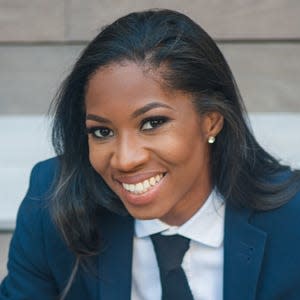Microaggressions, safety fears: The devastating impact of anti-Asian hate in the workplace
Anti-Asian violence during the COVID-19 pandemic has had profound effects on the work lives of Asian and Pacific Islander professionals, from racist incidents and microaggressions to safety fears.
Nearly two-thirds say the ongoing violence against their communities has negatively affected their mental health and nearly half say it has negatively affected their physical health, according to a new report “Strangers at Home: The Asian and Asian American Professional Experience.”
Half of the professionals surveyed by think tank Coqual say the racially motivated hate has made it difficult to focus at work and 62% say they feel unsafe while commuting yet too few employers offer remote work options.
'Consequences can be devastating': How noncompete agreements harm women and people of color
Supreme Court is more diverse than ever: But the lawyers who argue before it? Mostly white men.
Asian professionals fear for their psychological, physical safety
Saturday’s massacre in Monterey Park, a predominantly Asian American community near Los Angeles where 11 older people were fatally shot at a dance ballroom and Monday's Half Moon Bay mass shooting where a man killed seven people at two California mushroom farms, have only heightened fears in the Asian community.
With Asian and Asian American professionals fearing for their psychological and physical safety, corporate silence and inaction is harmful, Coqual CEO Lanaya Irvin told USA TODAY.
Almost half of the professionals say it's very or extremely important for their companies to address violence against the Asian American and Pacific Islander community. Yet only about 1 in 4 say their company is vocal about it.
“This cohort is experiencing a material impact to their mental health and their capacity to be productive contributors in their organizations,” Irvin said in an interview. “This has long-term implications for one’s ability to advance, to thrive."
More than 1 in 3 Asian professionals have experienced racism at work
Brutal images of Asians and Asian Americans being beaten, spit on or called slurs have forced corporate professionals to open up about what they routinely experience at work.

More than 1 in 3 Asian and Asian American professionals say they have experienced racial prejudice at their current or former companies, the Coqual study found. The rates are similar for members of the East (37%), South (38%), and Southeast Asian (32%) groups.
Coqual surveyed 2,634 college-educated professionals in addition to conducting focus groups and interviews.
According to Irvin, Asian professionals also routinely encounter microaggressions such as being seen as the “perpetual foreigner,” as in colleagues assuming they were not born in the U.S. and asking “where are you really from?” or commenting "your English is really good."
Harmful stereotypes popularized by the model minority myth – the perception that Asian Americans are so hardworking and successful that they don’t face racism at work – are also pervasive, Irvin said.
Too few Asians in corporate leadership, especially women
At the root of the problem? Too few Asians in corporate leadership, according to Irvin.
Studies show that no matter how much education and experience they attain, Asians are not fairly represented at the management and executive levels.
According to workforce diversity data collected by USA TODAY from S&P 100 companies, Asian representation drops by almost half from the professional to executive ranks.
That slide is even steeper for Asian women. Asian women are half as likely as white women to hold an executive role, according to a USA TODAY analysis. The disparity is on par with statistics for Black women and Latinas.

Pacific Islander employees invisible at work
“This cohort is surrounded by colleagues and leaders who don’t know how to support them,” Irvin said.
While Asian Americans as a whole are the nation’s best-educated and highest-earning major racial or ethnic group, they are not a monolith. They hail from different countries and cultures, class backgrounds and immigration paths. The sharp underrepresentation of Pacific Islanders has relegated them to invisibility, erasure and exclusion in the corporate world, Irvin said.
Asian women missing at the top: Our data shows why
Irvin, who advises corporate leaders on diversity, equity and inclusion matters, says she's urging companies to diversify their leadership ranks.
Asian employees lack role models, sponsors
Asian and Asian American professionals are the least likely of any racial group surveyed by Coqual (29%) to say they have role models at their company, least likely to say they have strong networks (17%) and least likely to have a sponsor (21%).
Having advocates in powerful positions is critical to advance the next generation of diverse corporate leaders, according to Irvin.
“Bring them into the conversation and think about ways you can better deliver on the promise of advancement and development,” Irvin said.
This article originally appeared on USA TODAY: How anti-Asian hate, racism are harming Asian professionals at work

 Yahoo Movies
Yahoo Movies 
